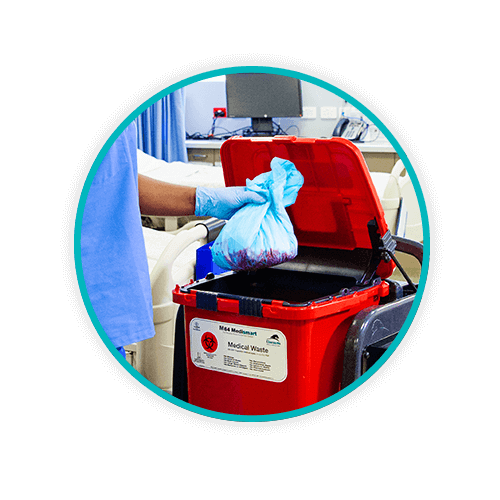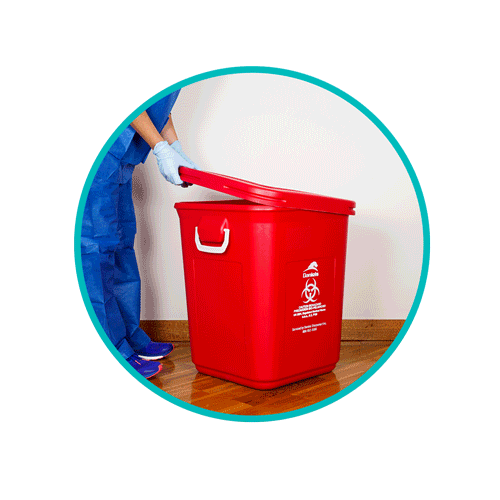Risks and Consequences of Improper RMW Disposal

The Environmental Protection Agency (EPA) stipulates numerous regulations for proper hazardous waste disposal, collection and disposal of biohazard waste, and medical waste removal processes. Failure by any healthcare facility to adhere to the regulations increases the risk of fines, penalties, and other consequences.
TALK TO A COMPLIANCE EXPERT TODAY
Compliance is Essential when it comes to Medical Waste Disposal
Size or volume of medical waste generated is immaterial to proper medical waste disposal. Every waste generator is held to both federal and state regulations, and non-compliance may result in both financial and civil penalties. The EPA and the Resource Conservation and Recovery Act (RCRA) are just two of the many regulatory agencies responsible for overseeing the regulations and compliance standards applicable to medical waste generators.
The RCRA was established in the 1970s to improve methods for hazardous and non-hazardous waste disposal, with its primary goals focused on:
- Protecting humans who may come in contact with different types of medical waste (including surgical waste, pathological waste, anatomical waste, and biohazard waste);
- Protecting the environment (from pharmaceutical waste, microbiological waste, clinical waste, and all types of non-hazardous and hazardous waste disposal);
- Reducing the amount of medical waste through reduction, recycling, or other methods of environmentally safe disposal methods.
Need RCRA Hazardous Waste disposal?
Additional agencies involved in medical waste disposal include:
- The Environmental Protection Agency (EPA) – the primary regulating agency for federal programs for proper handling and disposal of any type of waste that may impact human health or the environment
- The Drug Enforcement Agency (DEA) – stipulates regulations regarding the handling and disposal of controlled substances
- The US Food and Drug Administration (FDA) – suggests guidelines regarding the disposal of unused medications
- The Occupational Safety and Health Administration (OSHA) – identifies regulations regarding handling of blood borne pathogens, worker safety, and handling and labeling of wastes in all healthcare scenarios
- Department of Transportation (DOT) – oversees regulations for the sorting, packaging, as well as transportation of wastes
In addition to federal guidelines, state guidelines also apply to healthcare waste management and identification and registration of medical waste generators, medical waste treatment facilities, haulers, and containment or treatment methods for numerous types of waste that involves:
- Segregation
- Storage
- Containment
- Washing and decontaminating containers
- Designating accumulation areas
- Types of compactors or grinders
- Incinerators
Guidelines are in place to ensure safety to life and land, as risks of exposure to improperly disposed medical waste has a detrimental impact on both.
Human and Environmental Impact of Inadequate Healthcare Waste Management
Non-compliance to proper medical waste disposal not only affects the pocketbook, but human safety and the environment. The CDC reminds healthcare professionals that risks of exposure to blood borne pathogens are linked to transmission of a number of serious health ramifications including:
- Hepatitis C (HCV)
- Hepatitis B (HBV)
- Human immunodeficiency virus (HIV)
Dangers to human health and wellness also result from improper disposal of medical waste that ends up in landfills. Pathogens leaching into fresh water supplies and potentially becoming airborne are of major concern to health agencies. Improper disposal of a sharps container or used syringes containing remnants of contaminated blood or drugs pose dangers anyone who finds such items. Inadequate segregation and disposal of chemical, pharmaceutical and chemotherapy waste increases the risk of pollution to beaches or spills into lakes and rivers. Improper incineration methods release potentially toxic or carcinogenic waste particulates into the air. Fines and penalties will apply!
Fines and Penalties
Fines and penalties for improper medical waste disposal are serious. The EPA recently increased penalties for improper waste disposal to encourage compliance and cooperation under RCRA. As of 2018, fines for violating RCRA laws can range from $22,500 to just over $93,000! Fines can be assessed based on a violation or daily basis. That’s just one regulatory agency. Healthcare facilities failing to comply with proper pharmaceutical waste disposal, pathological waste, biohazard waste, or even improper disposal of a sharps container may face fines from other regulatory bodies found within the Clean Air Act, the Clean Water Act and the Comprehensive Environmental Response, Compensation, and Liability Act.
State guidelines are very specific regarding fines and penalties for violation. For example, the California Code of Civil Procedure states that a first offense by a small quantity generator may face fines of $1,000 per infraction while larger quantity generator may be fined $2,000 and up to one year in a county jail. Additional infractions incur increasingly severe penalties ranging from $5,000 and up to $25,000 as well as possible jail time. A generator who makes false statements or fails to register can incur civil penalties of $10,000 per violation, with such fines accruing for every day the violation continues.
Can you afford not to be compliant?
Daniels Health ensures complaint solutions
With over 40 years of experience, we understand the gravity of compliance when it comes to healthcare waste management. Our team is aware of your state’s guidelines regarding infractions, violations, and possible fines and/or penalties associated with them. We work with you to develop a healthcare waste management plan that meets your needs and upholds your safety. Compliance issues with government and state regulations can be overwhelming for healthcare facilities, its important to be connected to experts that can help you navigate regulations.
At Daniels Health, provide up-to-date instruction in state and federal regulatory changes and individual facility requirements. Our online compliance portal delivers multi-user access to millions of MSDI’s and safety data sheets as well as online training and certification, and our clinical teams help to ensure that waste is correctly segregated before transportation. Non compliance is simply not worth the risk.
To talk to one of our team member’s about our compliant medical waste management solutions, click here.
Let's Talk!
Your time is valuable, and we don’t want to play hard to get. You can either phone us directly on the details listed on our contact page, or feel free to fill out this short form and one of our team members will get back to you as quickly as possible.
